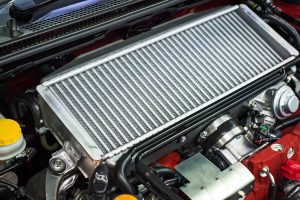Excessive heat can be a problem for car engines, which is why you need your cooling system’s radiator to be fully functional while on the road. When a radiator breaks down, the coolant can no longer keep cool, and neither can your engine. So if you ever notice the following indications of a faltering radiator while driving around Englewood, NJ, or nearby, visit a Lexus technician for radiator repair without delay.

Does Your Vehicle Need Repairs to the Radiator?
Your Engine’s Overheating
The most urgent sign of a malfunctioning radiator is an overheating engine. Overheating can rapidly cause mechanical parts inside an engine to seize up and stop moving. The pressure of so much heat building up may also blow the gasket.
The first indication of an overheating engine is usually the engine temperature gauge on your instrument panel swinging up into the red. Your car will also start making strange ticking and knocking sounds, and you might see white steamy vapor leaking from under the hood as the coolant starts to boil.
You Spot Leaking Coolant
On the rare occasion when coolant leaks, it usually originates from the radiator cap, one of the radiator hoses, or a hose connection. In the case of a leak, you might spot a puddle of brightly colored fluid under your car when you pull away from parking. And if you pop the hood, you may also see discolored stains on various engine parts where the dripping coolant has burned away.
Your Coolant Turns a Rusty Color
While inspecting your fluid levels, always pay attention to the color of your coolant inside the coolant reservoir. If it ever becomes a murky, rusty brown color, it’s quite likely that your radiator has developed internal rust.
While modern coolant does have effective anti-rust properties that protect against this, these anti-rust properties can sometimes begin to fade as the coolant ages. This is one reason why it’s so important to have your coolant periodically flushed and refreshed.
Your Radiator’s Rusting Externally
External rust can also threaten the structural integrity of a radiator. If you notice corrosion or rust begin to build up on any part of your radiator, clean it with a good anti-rust product.
Unfortunately, extensive rust often means the radiator needs to be replaced. Cars left unused for long periods of time are at risk of a rusting radiator, as are cars used in excessively cold or humid climates.
How a Technician in Englewood, NJ, Can Inspect Your Radiator
While checking your cooling system, a technician will pressure-test the radiator’s thermostat, water pump, fan, and cap. They’ll also check the radiator’s fins for clogging debris, rust, or other damage, and they’ll check your coolant’s condition, flushing it if necessary, while also examining all the hoses and connections for any sign of coolant leaks.
Have your radiator inspected, repaired, or replaced today at DARCARS Lexus of Englewood. We’re proud providers of both exceptional vehicles and excellent customer service.




